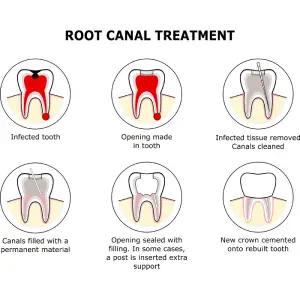Root Canal Treatment at Affordable Cost in India
Root Canal is a procedure used to treat infected teeth which eliminate infectious bacteria from the root of the teeth to prevent them from reinfecting other healthy teeth. A general dentist or endodontist usually performs this procedure under general anaesthesia or local anaesthesia also.
Cost of Root Canal Treatment In India:
The cost of a root canal in Mumbai, Nasik, or other locations may vary, and it depends on the type of hospital and the city you choose. In Hyderabad, Traditional Root Canal Treatment cost is between INR 4500-INR 7500 and Laser Root Canal Treatment is between INR 5000-INR 8000.
|
City |
Average Cost Range |
|
Hyderabad |
Rs 4,500 to Rs 7,500 |
Secure your health with a second opinion. Make informed decisions and book your appointment today!
Get A Second OpinionSigns You May Need a Root Canal
A root canal is a procedure that must be performed when the inner pulp of the tooth becomes infected or damaged beyond repair. If so, then these symptoms may be a sign you need a root canal:
- Severe Tooth Pain: Persistent and severe pain, particularly when biting or putting pressure on the affected tooth, may indicate that the nerve in the tooth has been damaged or is infected.
- Sensitivity to Hot or Cold: Persistent temperature sensitivity may indicate infection within the tooth pulp. The suffering does not go away after the hot or cold are removed.
- Gums Swelling and Tenderness: Infection may also mean swollenness around the tooth that hurts alongside tenderness or a pus-filled pimple on the gum line, which can require a root canal.
- Darkening of the Tooth: When this happens to a tooth, it signifies that the nerve of the tooth is going dead or already dead.
- Frequent Tooth Abscesses: AbscessA collection of pus at the end of a tooth or in the surrounding tissue caused by bacteria getting into an infection site there. Seeing an abscess on or close to a tooth repeatedly is one of the most obvious signs that you need a root canal.
- Discomfort While Touching Or Applying Pressure On the Tooth: The tooth nerve could be inflamed or infected if your tooth hurts to touch and/or apply pressure, and treatment is necessary.
- Difficulties When Biting or Chewing: In other words, if you have trouble chewing or it hurts to chew, then this could indicate that the tooth nerve is inflamed or perhaps infected, which usually means a root canal.
How to Prepare For Root Canal Treatment
- The first step is to consult your doctor to clear all your doubts.
- Avoid smoking & drinking alcohol 24 hours before the procedure.
- Eat before the surgery and avoid eating anything without consulting your doctor.
- The dentist may ask you to take a painkiller before the surgery.
- The procedure is conducted under general or local anaesthesia based on your specific condition.
- It is an outpatient procedure; you will be discharged on the same day.
- Take complete rest at home after the surgery for quick recovery.
Who is Not Eligible For Root Canal?
A person with below conditions may not be eligible:
- high blood pressure/hypertension
- Is on blood thinners
- Suffers from diabetes
- Suffers from autoimmune diseases
- Suffers from infections and fever
- Suffers from osteoporosis

Root Canal Techniques
There are different techniques for a root canal, but all of them aim to treat the infected tooth by removing the infection or inflamed substances from inside the teeth. The variations generally depend on the dentist and their tools for root canals. So, here are the techniques used to treat root canals:
Nonsurgical Root Canal Treatment
In this method, small holes are made in the teeth to clean the infected pulp, and fillers are used to seal the inner chambers. This method is helpful if the teeth have experienced extreme decay.
Apicoectomy
It is done if the nonsurgical root canal fails. This procedure, also called the microsurgical procedure, uses general anaesthesia where the tip of the root is removed, and filling is used to seal the canal.
Waterlase System From Biolase
Biolase Waterlase involves lasers ( a specific wavelength of light), water, and air to remove bacteria from root canals. This system helps patients avoid the need for retreatment because of its non-invasive method, due to which the teeth remain healthy for a more extended time.
Root Canal Retreatment
As the name suggests, in this procedure, previously implanted root canal filling material is removed in this procedure. The endodontist will carefully clean out the infection in the tooth, and finally, the tooth will be restored and sealed.
Ready to take control of your health journey? Book your appointment now and start your path towards wellness today!
Book an AppointmentComplications of Root Canals
This means that root canals can fail – sometimes because they were never the answer to treating your tooth infection. So, if you have a very damaged tooth, your root canal may not be sufficient to fix what is wrong.
Depending on the severity, your healthcare provider will discuss other options if your root canal does not work:
- Re-do a root canal on your infected tooth.
- Extraction (removal) of your diseased tooth and, as a replacement, an implant or bridge.
Why Choose Medicover
Our dentists and orthodontic surgeons
At Medicover, we have the best team of doctors who provide comprehensive care and treatment to patients.
Medicover is the best multispeciality hospital providing 24X7 comprehensive care and treatment by constantly pushing the lengths to seek solutions for better patient care.
We have the most advanced technologies, equipment and an experienced team of dentists and endodontists to perform root canal procedures.
